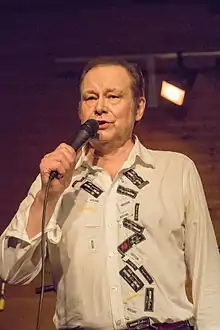
Aarne Tapani Kansa (born 9 March 1949 in Hamina, Finland) is a Finnish singer.
Career
Tapani Kansa made his first record deal in 1967 and had a breakthrough the next year, with his version of the hit song Delilah, translated into Finnish. Tapani Kansa had established a career in singing at a very young age. He had started studying singing in the Kotka music academy in the middle 1960s. His colourful performance style brought him much work on television. His early hit songs include Kuljen taas kotiinpäin ("I am walking home again"), Eloise and Käymme yhdessä ain ("We will always go together"). In 1976, Tapani Kansa achieved great success with his songs R-A-K-A-S ("D-E-A-R"), Hafanana and Melina. The next year he released the album Mistä rakkaus alkoi ("Where did the love start"), which presented a more pop music style Tapani Kansa: The album contains a Finnish version of Elton John's song Sorry Seems To Be The Hardest Word - in Finnish Anteeksi on vaikea pyytää ("It is hard to apologise").
The 1970s brought rock and roll and show music to Kansa's concerts. Hits of the time included Rokkivaari Hotanen ("Hotanen, the rocking grandpa", translated from Daddy Cool by Darts) and Kalajoen hiekat ("The sands of Kalajoki", translated from California Dreamin' by The Mamas & the Papas). Veikko Nieminen brought a more sociological aspect to the lyrics in connection with the new age.
Tapani Kansa also studied singing at the Sibelius Academy from 1974 to 1978, and in the late 1970s, he enlarged his repertoire: The album Moment Musical (1978) was made in co-operation with Heikki Sarmanto, who arranged a musical version of Eino Leino's lyrics into the album. Another artist on the album was Maija Hapuoja. In 1987, Kansa recorded the classic Hopeinen Kuu ("Silver Moon") and the album Betonimylläri, containing poetry by Lauri Viita. 1988 brought Oskari Merikannon kauneimmat laulut. The album Kultaniityt (1994 introduced, among some translated songs, also Tapani Kansa as a songwriter. On the album Päivä jolloin rakastat ("The day you love", 1999), Kansa interpreted Argentinian tangos, while Valaistu ikkuna ("The lit window") included Finnish film songs. The album Salaisuudessain ("In my secret", 2002) was a return to the pop music style, and a new direction came in autumn 2004, when Tapani Kansa interpreted Tapio Rautavaara's songs on the album Tapsa ja Rautavaara.
In 2002, Tapani Kansa appeared in the Pojat group formed by Danny and Markku Aro, performing hit songs by the artists from the 1960s.
In 2006, Kansa released the album Kulkumies ("The traveller"), which he wrote the lyrics to and co-arranged the melodies with Kassu Halonen. In the same year, Kansa was nominated for the Iskelmä-Finlandia prize.
Tapani Kansa has written and arranged his own works. He has also appeared on theatre and operettas and acted on TV. In 1987, Kansa was awarded the Erikois-Emma prize.
Discography
Albums
| Year | Album | Peak positions |
|---|---|---|
| FIN [1] | ||
| 1995 | Joulun rakkaimmat laulut | 22 |
| 1996 | Unessani nainen tanssii | 23 |
| 1997 | Juhlalevy | 9 |
| 1999 | Päivä jolloin rakastat | 18 |
| 2000 | Valaistu ikkuna | 27 |
| 2002 | Salaisuudessain | 20 |
| 2004 | Tapsa ja Rautavaara - lauluja elämän poluilta | 5 |
| 2007 | 40-v. juhlalevy | 24 |
| 2009 | Rakkautta on, rauhaa ei | 34 |
| 2013 | Särkyneen toiveen katu | 11 |
| 2018 | Sielunlaulu | 49 [2] |
Personal life
See also
References
- Latva - Tuunainen: Iskelmän tähtitaivas. 500 suomalaista viihdetaiteilijaa. WSOY, 2004
- The Helmet Internet library
Notes
- ↑ "Tapani Kansa discography". finnishcharts.com. Hung Medien. Retrieved 15 November 2013.
- ↑ "Suomen Virallinen Lista".
- ↑ Pogreboff, Sergei (15 September 2011). "Suomenvenäläisyys ja sen merkitys". LiteraruS (in Finnish). Retrieved 17 March 2021.